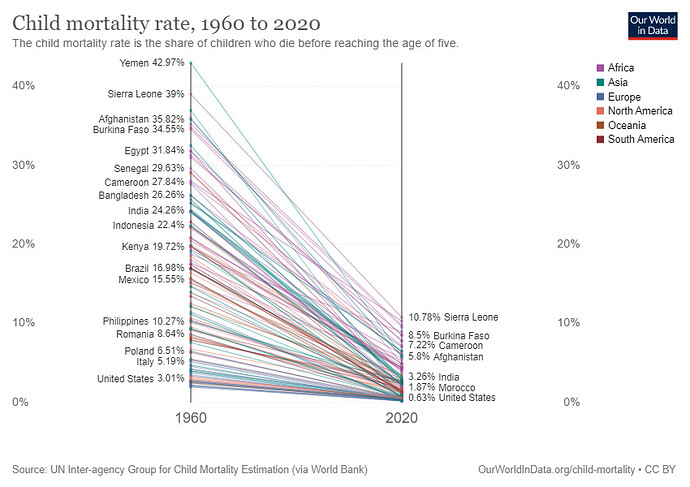It just depends on what it is. Food is harder to make than iphones.
I don’t think it’s an issue of the ease to make things. We actually have too much food in the world. But a good chunk of the people still starve every year to the point of death.
Energy is not going to be any different. Excess energy isn’t going to be free to poor people. They will continue to live in the cold and darkness.
I agree that assuming we “solved” energy with fusion, it’s will be more like food than cell phones. Because it will still be difficult to deliver to non-urban areas.
Also, IMO, this statement really means the opposite of what you suggest.
Half the children under 5 die of malnutrition because we saved them from sickness, using modern rich people technology.
If we didn’t save them from sickness, then a small % would be dying of starvation.
that’s lovely.
My point is there shouldn’t be ANYONE starving based on the amount of food we produce. But again, we don’t just give free shit away. Food or anything else. We’d rather the poor not have anything than free shit.
This is true even on a personal level.
It is lovely. Way less people die. We should pat our selves on the asses for that. Giving away more food would be great too, I agree.
I don’t know about “we”.
Most people don’t give food to homeless people on the street for the excess food they have.
Fair enough. My original point was just that technology spreads. Which in a way, is not really a thing to be proud of.
As it’s not like people are any more or less generous from year to the next.
And we give away copious amounts of food, both domestically and abroad.
Distribution is a problem though.
Domestically if there are children under 5 dying of starvation it’s probably either a medical or a parenting issue because between WIC and food stamps they should be able to get what they need, to say nothing of charities willing to help. (I think most of those deaths are NOT from starvation though.)
Abroad we give away tons of food, but a lot of it gets stolen before getting to its intended recipients. Distributing food to remote rural villages is difficult. I think NGOs like World Vision actually do a better job than the federal government, but on both sides they are certainly trying. It’s hard when a warlord & his army approaches your staff with automatic weapons and insists you give the food to him though.
By an extremely weird coincidence I tried to help a random crazy, drunk, poor guy last night. He was trying to find a house that was a mile away, but couldn’t understand English (and didn’t seem able enough to follow Spanish either). I tried to point out the street, and enter the address into his smart phone, but ultimately gave up, and left him with my wife’s snuggy.
you speak Spanish?
No, another passerby talked to him. I had like 3 years in high school and forgot all of them.
You guys should’ve tried google translate
The other passerby was probably a native speaker.
He also probably threw away the snuggy immediately, but it was freezing out and the guy was so lost and in a tshirt.
Food stamps is socialism.
That’s why I say, some form of socialism is needed when production/energy/manufacturing start to get concentrated in the hands of a few.
In general, charity is not that dependable. People only become charitable when they are EXTRA sure that they themselves are at a certain comfort level.
Multi-billionaires might donate 1 or two million. Multi-millionaires might donate a few thousand. And the average household might donate a few dollars.
With things like energy and money, there’s always the “what if I’ll need this tomorrow” mentality that prevent people from donating.
At least food has an expiration date.
I agree with this. Ultimately injustice is a failure of will, not a failure of knowledge or means.
But the cheaper it is the lower the bar to be rich enough to enjoy it? That’s the premise of what SV is describing. Sure there will always be people who don’t make the “rich enough” cut, but fusion has the potential to make the bar incredibly low. And is what has happened with loads of other things (cars, smart phones, televisions, etc.)
Republicans in the US don’t even argue for literally 0 socialism (i.e. something like pure capitalism)
Exactly. Yeah, phones are an interesting example. In 1898 the federal government temporarily put an excise tax on telephone service, a luxury tax only affecting the very wealthy. This was to fund the Spanish-American War.
True to their word, the temporary tax only lasted 108 years. But telephones were no longer a luxury item owned by only the very rich for much of that time.
